by California Casualty | Safety |
Car crashes are the number one killer of children 1 to 12 years old in the United States.
As part of National Preparedness Month, today we will be talking about Car Seat Safety (it’s also National Child Passenger Safety Week!)
Just how important is making sure your child is buckled in correctly to an age and size appropriate car seat?
On average, 2 children are killed and 325 are injured in car accidents every day.* This fatality rate could be reduced by about half if the correct child safety seats were always used.**
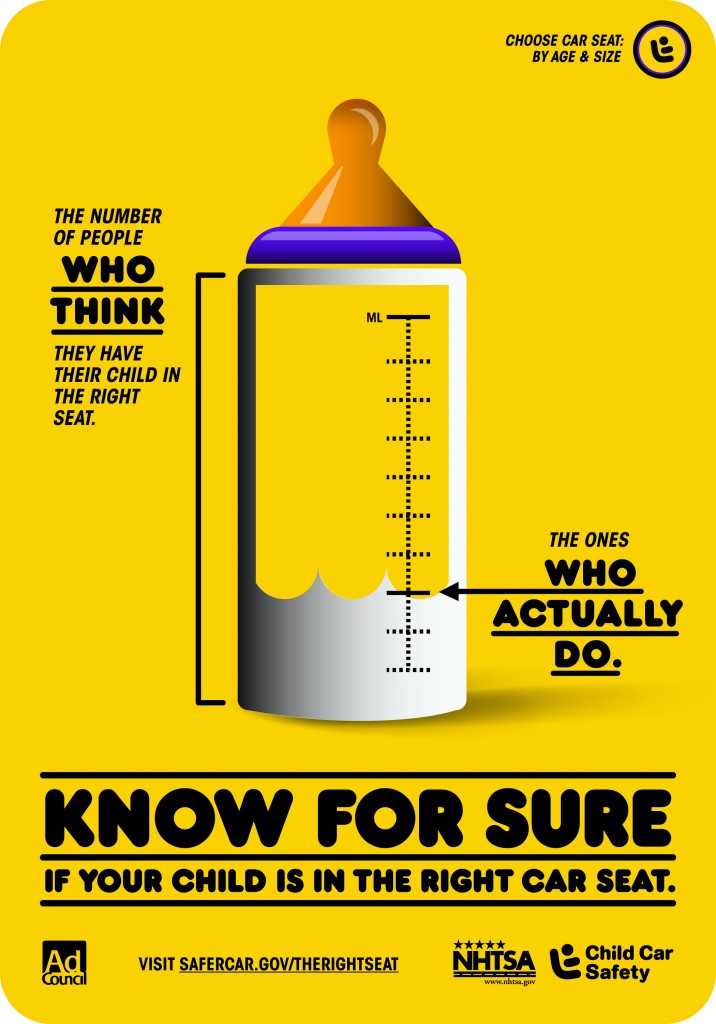
So how can you check to make sure you are using the correct car seat in the correct way for your child?
Check out these great recommendations for car seats and boosters as well as installation and maintenance tips.
To make sure your child’s seat is the correct one installed in the correct way, you should have it inspected by a certified technician. Often, these certifications are free. You can find a location close to you by clicking here.
We also wanted to share a great tip with you that we found and shared on our Firefighter Pinterest board. It started with this photo:
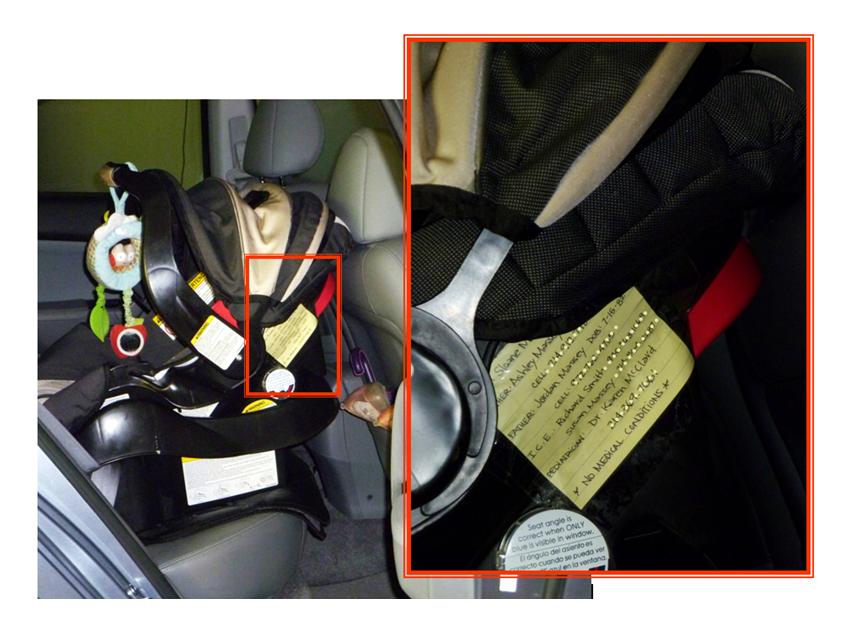
In this photo, you can see the parent has attached Emergency Contact and Medical Information.
When we found this Pin, it was shared by a Firefighter/Paramedic. He commented that this kind of information is critical in the event of a car crash. In case the driver is separated from the child or otherwise unable to communicate medical information to First Responders, securing vital information to a car seat will help provide EMTs with potentially life-saving information.
While some newer car seats come with a spot for this information, many do not. Even if your child’s car seat does not have a specific spot for this info, you can secure it to the seat yourself. Simply write up the information (we recommend using bright or neon paper so it’s more noticeable) and use waterproof, clear tape to secure it to your car seat.
Here are some suggestions on what to include:
- Child’s Name
- Date of Birth
- Parent Identification and Contact Information (Names and Phone Numbers)
- Emergency Contact Information (Name and Phone Number)
- Primary Physician/Pediatrician Information
- Any known medical conditions
- Any known allergies
- Any relevant medical information
No matter how safe of a driver you are, remember that there are other drivers on the road and that accidents happen every day. Help safeguard your child’s safety by having your car seat inspected and by securing contact and medical information to your child’s car seat.
Sources:
*Based on National Highways Traffic Safety Administration c2010 Crash Data
**Based on the latest mortality data currently available from the CDC’s National Center for Health Statistics
by California Casualty | Auto Insurance Info, Safety |
Car accidents happen.
Whether it’s a fender bender or a pileup, your fault or someone else’s, they just happen.
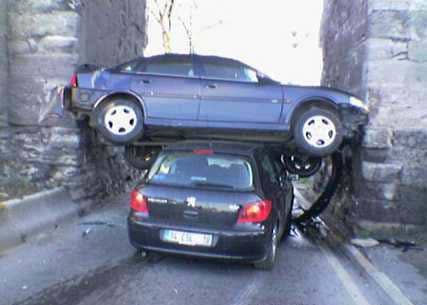
So when we talk about preparedness during National Preparedness Month, car wrecks should be on your list of scenarios for which you are prepared and ready.
Because how you act following a car wreck won’t just affect the Insurance Claims process, it could affect the safety and security of yourself, your property and your identity.
Did you know that sharing some personal information could put you at risk for identity theft following a car accident?
Check out this information from a 2012 National Association of Insurance Commissioners survey:
- Thirty-eight percent of consumers believed they should share their driver’s license number with the other driver — one in six would even allow the other driver to photograph the license as a convenient way to exchange information.
- So what’s the risk? Many retailers accept driver’s license information to verify your identity over the phone. In fact, your license number is the most common way to confirm your identity after Social Security number and date of birth.
- Twenty-five percent of consumers surveyed said they would share their home address.
- So what’s the risk? Actually, your home address gives identity thieves the physical location of your mail or garbage, the first place criminals often look for personal financial information. And, now a stranger knows where you live, possibly putting your personal safety at risk.
- Twenty-nine percent of survey respondents believed they are required to share personal phone numbers. In fact, sharing your phone number is rarely necessary.
To help you take some of the guesswork out of what to share and what to safeguard following an accident, the National Association of Insurance Commissioners released an app for Smartphones called The WreckCheck App.
- It’s free of charge!
- Works for iPhones and Android phones
- Outlines what to do following an accident
- Walks you through process of creating accident reports
- Tells you which pictures to take
- Helps document damage
- Assists in attaining and sharing only necessary information
- Allows you to email completed reports to yourself or Us (your insurance company!)
For more information on how to download or use the WreckCheck App, click here.
by California Casualty | Safety |
It’s officially September!
Goodbye Summer sunshine, hello Fall foliage!

Aside from being the season of cider and sweaters, Fall is also…
National Preparedness Month.
Here at CalCas, we will be celebrating by posting weekly Preparedness content right here on our Blog 🙂
First on deck: A Preparedness App!
As a recent iPhone converter, I am all aboard the App train. I’m always on the lookout for exciting new stuff and this new app from the Insurance Information Institute is one such find!
It’s called the “Know Your Plan” App and it’s all about streamlining your Disaster Prep Plans.
What you should know about this App:
What it provides:
- A library of preloaded preparedness checklists for disasters including:
- Hurricanes
- Floods
- Earthquakes
- Tornadoes
- Severe Cold
- Wildfires
- Evacuation
- Tips for preparing an emergency kit
- Important property protection information
- Step-by-step preparedness tips
- Custom lists for your personalized preparedness plan
- Targeted task completion dates
- Tools to chart your progress (including a countdown feature!)
- Checklists share options for family and friends
- Evacuation resources (even one for pets!)
- Geotargeted emergency alert feeds for up-to-the minute information about local evacuation routes and other disaster information
- User-customizable notes
As Fall and September swing into full gear, make sure you are ahead of the curve when it comes to Disaster Preparedness.
After all, you never know when you may need it.
By compiling disaster preparedness information and plans all in one place–on your phone–you are putting life-saving plans in place.
Stay tuned for more great Preparedness content throughout the month!
by California Casualty | Firefighters, Safety |
Do you have (or are you yourself) a student going away to school this fall?

(awww…)
The lists of things to remember to do before leaving home is immense: dorm necessities, vaccinations, class registrations… the list goes on and on.
In all the chaos and excitement, it’s hard to remember everything.
But the Los Angeles Fire Department came out with an important reminder this month: Prepare for the possibility of a fire in university housing.
Just like you have fire plans at home, at school, and at work, you also need one for Campus Housing.
Think it will never happen at your school?
155 people have died in campus-related fires since January 2000.
The National Fire Protection Association says fire departments responded to an average of 3,840 structure fires in dorms, fraternities, sororities and barracks between 2005-2009. Every year (on average), fires caused:
- 3 civilian deaths
- 28 civilian fire injuries
- $20.9 million in direct property damage
So what can YOU do to keep yourself or your child safe while they’re away?
1. Identify fire risks. 81% of reported fires involved cooking equipment
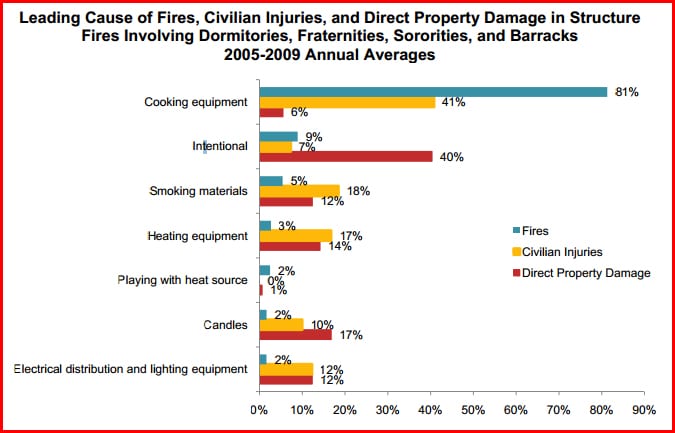
2. Know the Common Factors in Housing Fires: (source)
- Fires in campus housing are most common between the hours of 5 and 11 p.m.
- Lack of automatic fire sprinklers
- Missing or disabled smoke alarms
- Careless disposal of smoke materials
- Impaired judgment
- Fires originating on upholstered furniture on decks or porches
3. Follow these Tips: (source)
- Look for fully sprinklered housing
- Make sure your housing unit has smoke alarms inside each bedroom, outside every sleeping area and on each level
- Confirm that smoke alarms are tested at least monthly
- Never remove batteries or disable alarms
- Learn building evacuation plans and have a copy on hand BY the door. No organized plan? Make sure YOU have a fire escape plan with two ways out of every room
- Cook only where permitted
- Cook only when alert and not sleepy or drowsy
- Different states have different restrictions for use of BBQ grills, fire pits and chimeneas. Check with your local fire department before using these items- especially if you moved from out-of-state!
- Check with school rules on electrical appliances in your room
- Use the right surge protectors for your computers or electronics and make sure the protector is plugged directly into an outlet
4. Ask these Questions when you arrive at school or drop your student off there
We know this is a busy time for everyone. There’s a lot of excitement and preparation that goes into starting a new semester at school. But please be sure to take FIRE SAFETY into account. It’s a real risk that is too often forgotten, which can lead to deadly consequences.
Additional resources:
by California Casualty | Firefighters, Nurses, Peace Officers, Safety |
Like everyone else across the country, the violent deaths of 12 innocent people in an Aurora, Colorado movie theatre left me heartbroken.
My mind flooded with questions and my heart ached for every victim, every family member, every friend and every member of the Aurora community that was touched by this devastating tragedy.
I was inspired and heartbroken as, one by one, each victim’s story came out. The six-year-old who was out seeing a movie with her babysitter. The two young men who gave their lives to save their girlfriends. The heroic members of the Armed Services who died in that theatre.
The list goes on.
And now, a week out, the question remains: How do we go on? How do we heal?
This question is particularly true of a few certain groups of Heroes. Heroes whose role in responding to tragedies like Aurora story is often overlooked.
The police officers who responded to the horrific scene that night. Who had to put their personal feelings aside to professionally process the scene and eliminate any existing threats- including the booby trapped apartment of the suspect. More Here.
The paramedics who treated and transported victims. Who held it together despite seeing the carnage up close, triaged the 58 innocent people with injuries, and comforted them on their way to hospitals. More here.
The nurses and medical staff who continue to heal survivors. Who tirelessly support their patients down a long and tough road to recovery, answer the tough questions, and experience firsthand the pain, sorrow, and confusion of the victims and their families. More here.
I can’t imagine what it must have been like responding to that scene. The horror of the loss. The pain of injured. The questions of the survivors. So I looked to some of my favorite Police Officer, EMT and Nurse bloggers. I asked them what advice or words of support they could offer to their professional colleagues in this time of processing and healing.
In three posts below, I have posted some fantastic responses, thoughts, and resources from Police Blogger John Marx of Cops Alive, EMT Blogger Captain Morse of Rescuing Providence, and Nurse Blogger Keith Carlson of Digital Doorway.
by California Casualty | Safety |
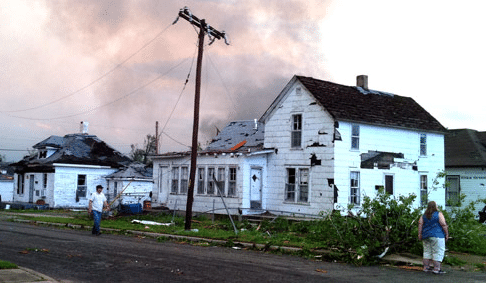 The recent destructive tornado outbreaks in the US caused widespread damage in several states. In the aftermath, once thing most people don’t consider is threats to their financial well-being from identity thieves and fraudsters.
The recent destructive tornado outbreaks in the US caused widespread damage in several states. In the aftermath, once thing most people don’t consider is threats to their financial well-being from identity thieves and fraudsters.
Fortunately, customers of California Casualty have identity theft protection from Identity Theft 911 included in their policies. This benefit can help protect your identity, while also providing guidance and help in recovering your financial peace of mind.
If your home is hit by a disaster such as a tornado or hurricane, we recommend taking the following steps as soon as possible to protect yourself from ID thieves:
- Protect important information and documents. Whether you’re in a shelter, staying with friends and family, never let these items leave your sight. They are the keys to your identity-and you will need this information to prove who you are.
- Ask the post office to hold your mail until you return home. This will keep thieves from finding sensitive materials that are left in your mailbox.
- During disasters criminals often prey on the emotions of citizens. Verify against scam charities by using Give.org or CharityNavigator.org.
- If you have any reason to believe that your personal information may have been exposed or is at risk, please contact our customer service line at 1-800-800-9410 if you’re a CalCas customer and we’ll put you in touch with IDT911.







